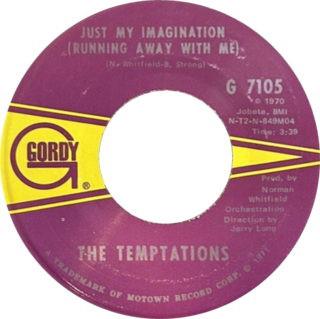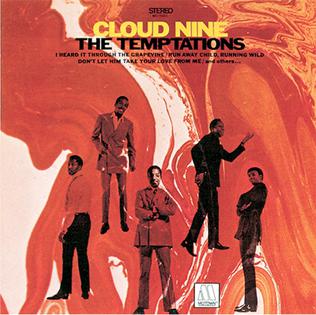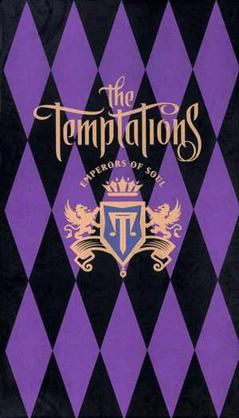Recording
Featuring all five Temptations trading lead vocals à la The Family Stone, [4] "Cloud Nine" was a marked departure from the standard Tempts sound: wah-wah guitars and a harder, driving beat propelled the record, as opposed to pianos and strings. The song also features the Cuban percussionist Mongo Santamaria on conga drums. Edwards, Eddie Kendricks and Paul Williams swap leads on the verses, bridges and choruses, such as this example from the first bridge:
Otis Williams has some brief lead lines on the last half of the song (i.e.: he repeats "Reality…"), and Melvin Franklin also gets a line near the end ("There's no difference between day and night…"). The lyrics for the song were about the struggles and pains of living poor, as opposed to being about relationship and love troubles. The broke, unemployed, and despondent main character in the song proclaims that he gets over all of his problems by "riding high on 'cloud nine'". This has been interpreted by many (including Motown head Berry Gordy) as a reference to drug abuse, although Whitfield, Strong, and The Temptations deny that "Cloud Nine" is about drugs. [4]
Cash Box called it "near revolutionary," praising the "touches of progressive pop in the track, elevated lyric message and the solid performance." [5] Record World said that "the kids will be on cloud nine when they hear it." [6]
"Cloud Nine" won Motown its first Grammy Award in 1969 for Best Rhythm & Blues Group Performance, Vocal or Instrumental, reached #2 in the U.S. R&B chart and #6 in the U.S. Pop chart, and led the way for the Temptations' full-blown venture into psychedelia, with increasingly eclectic and socio-political-themed records, including "Runaway Child, Running Wild", "Psychedelic Shack", and "Ball of Confusion (That's What the World Is Today)", following within the coming two years.

The Temptations are an American vocal group from Detroit, Michigan, who released a series of successful singles and albums with Motown Records during the 1960s to mid 1970s. The group's work with producer Norman Whitfield, beginning with the Top 10 hit single "Cloud Nine" in October 1968, pioneered psychedelic soul, and was significant in the evolution of R&B and soul music. The band members are known for their choreography, distinct harmonies, and dress style. Having sold tens of millions of albums, the Temptations are among the most successful groups in popular music.

Edward James Kendrick, better known as Eddie Kendricks, was an American tenor singer and songwriter. Noted for his distinctive falsetto singing style, Kendricks co-founded the Motown singing group the Temptations, and was one of their lead singers from 1960 until 1971. He was the lead voice on such famous songs as "The Way You Do the Things You Do", "Get Ready", and "Just My Imagination ". As a solo artist, Kendricks recorded several hits of his own during the 1970s including the number-one singles "Keep On Truckin'" and "Boogie Down."

"I Can't Get Next to You" is a 1969 No. 1 single recorded by the Temptations and written by Norman Whitfield and Barrett Strong for the Gordy (Motown) label. The song was a No. 1 single on the Billboard Top Pop Singles chart for two weeks in 1969, from October 18 to October 25, replacing "Sugar, Sugar" by the Archies and replaced by "Suspicious Minds" by Elvis Presley. The single was also a No. 1 hit on the Billboard Top R&B Singles for five weeks, from October 4 to November 1, replacing "Oh, What a Night" by the Dells, and replaced by another Motown song, "Baby I'm For Real" by the Originals.
"Psychedelic Shack" is a 1969 single for the Motown label performed by the Temptations and produced by Norman Whitfield. It became a hit single in 1970.

Psychedelic Shack is the twelfth studio album by The Temptations for the Gordy (Motown) label released in 1970. Completely written by Norman Whitfield and Barrett Strong and produced by Whitfield, Psychedelic Shack almost completely abandoned the "Motown Sound" formula, instead delving fully into psychedelia. Along with the hit title track, the album also features the group's original version of "War", which became a major hit for Edwin Starr later in 1970.

"Just My Imagination (Running Away with Me)" is a song by American soul group the Temptations, written by Norman Whitfield and Barrett Strong. Released on the Gordy (Motown) label, and produced by Norman Whitfield, it features on the group's 1971 album, Sky's the Limit. When released as a single, "Just My Imagination" became the third Temptations song to reach number one on the US Billboard Hot 100. The single held the number one position on the Billboard Pop Singles Chart for two weeks in 1971, from March 28 to April 10. "Just My Imagination" also held the number one spot on the Billboard R&B Singles chart for three weeks, from February 27 to March 20 of that year.
"Hum Along and Dance" is a soul song written for the Motown label by Norman Whitfield and Barrett Strong. Originally recorded by the Temptations, the song was later covered by Motown acts Rare Earth and the Jackson 5. The song is essentially an instrumental piece and a vehicle for scatting and improvisational vocals, since, as the chorus states, "ain't no words to this song/you just dance and hum along". All three versions of the song were produced by Whitfield.
"Runaway Child, Running Wild" is a 1969 hit single for the Gordy (Motown) label, performed by The Temptations and produced by Norman Whitfield. The single was both the second from their landmark Cloud Nine LP, and the second of their "psychedelic soul" tracks penned by Whitfield and former Motown artist Barrett Strong.

Sky's the Limit is the fourteenth studio album by the Temptations, released in 1971 through Gordy Records. The album includes the #1 hit "Just My Imagination ", the Top 40 hit "Ungena Za Ulimwengu ", and the original version of "Smiling Faces Sometimes", later a Top 5 hit for The Undisputed Truth.

Solid Rock is a 1972 album by The Temptations for the Gordy (Motown) label, produced by Norman Whitfield. The LP was the first made primarily without founding members and original lead singers Eddie Kendricks and Paul Williams. Frustrated by conflicts and fights with Temptations Otis Williams and Melvin Franklin, and producer Whitfield's steadfast insistence on producing psychedelic soul for the group when they really wanted to sing ballads, Kendricks had quit the act and negotiated a solo deal with Motown's Tamla label.

"Superstar (Remember How You Got Where You Are)" is a 1971 hit single for the Gordy (Motown) label, recorded by The Temptations and produced by Norman Whitfield. Something of an early ancestor to the "diss songs" prevalent in hip hop music towards the end of the 20th century, "Superstar" is an attack at two former Temptations members, David Ruffin (who had been fired back in 1968) and Eddie Kendricks (who quit the act in early 1971 and negotiated a Motown solo deal). The song appears on the 1972 album Solid Rock.

Greatest Hits II is a 1970 greatest hits album for The Temptations, released by the Gordy (Motown) label. The sequel to the first Temptations greatest hits LP from 1966, Greatest Hits II collects several of the late-1960s hits that followed the release of the first compilation. Included here are the final collection of David Ruffin-led singles, including "(I Know) I'm Losing You", "I Wish It Would Rain" and "I Could Never Love Another ", and the first of the Dennis Edwards-led psychedelic soul records, including "Cloud Nine" and "Psychedelic Shack". A new non-album single, the #3 hit "Ball of Confusion ", is also included.

Cloud Nine is the ninth studio album by American musical group The Temptations for the Gordy (Motown) label released in 1969.

Puzzle People is the eleventh studio album released by American soul quintet The Temptations for the Gordy (Motown) label in 1969. Produced entirely by Norman Whitfield, Puzzle People expanded on the psychedelic soul sound of the Temptations' previous LP, Cloud Nine. Although a few straightforward soul ballads are present, the album is primarily composed of Sly & the Family Stone/James Brown-derived proto-funk tracks such as the lead single "Don't Let the Joneses Get You Down", and the number-one Billboard Pop hit "I Can't Get Next to You".

The Temptations Wish It Would Rain is a studio album by the Temptations, released in 1968 via Gordy Records. It was the final release from the group's "Classic-5" era, during which David Ruffin, Eddie Kendricks, Paul Williams, Melvin Franklin, and Otis Williams constituted the Temptations' lineup.

Emperors of Soul is a 1994 box set compilation for The Temptations, released by Motown Records. The five-disc collection covers the Temptations' entire four-decade history, from the first recording of The Distants in 1959 to four new recordings by the then-current Temptations lineup of Ali-Ollie Woodson, Theo Peoples, Ron Tyson, and stalwart members Otis Williams and Melvin Franklin.
"I Could Never Love Another (After Loving You)" is a single recorded by the Temptations and released on Motown Records' Gordy label during the spring of 1968. The song is the last with lyrics by Rodger Penzabene, and as the final Temptations single to feature David Ruffin as lead singer.
"Isn't She Pretty" is a 1961 song recorded by The Temptations, and written by group members Eddie Kendricks and Otis Williams, as well as Motown's founder Berry Gordy. It was Gordy's first production with the group, and intended for released on the Miracle label, but it was shelved due to the label closing, as well as the fact that the Motown execs thought the song sounded a little too dated. It was finally released as the B-side for the group's 1962 single "Dream Come True", their first on the Gordy label imprint.
"(Loneliness Made Me Realize) It's You That I Need" is a 1963 song that became a 1967 hit single recorded by the Temptations for the Gordy (Motown) label, produced and co-written by Norman Whitfield. Billboard described the single as a "groovy rocker" that "is loaded with excitement and another top vocal workout."
"Farewell My Love" is a 1963 single by The Temptations for the Gordy (Motown) label. It was the last single that was written and produced by Motown president Berry Gordy for well over a decade, and the last released during the period of the "Original 5" lineup. It is also noted as the group's last single to miss the Billboard pop chart's Top 40 until 1971's "It's Summer". Up until now the group was jokingly referred to at this time as the "Hitless Temptations" by the Motown staff, much like their "sister" group, The Supremes, were called the "no-hit Supremes". However, their next single, the Smokey Robinson-produced "The Way You Do the Things You Do", would reach the Top 20 of the U.S. pop chart, breaking the group's streak of being "hitless".













